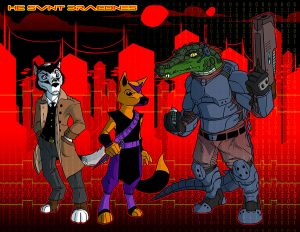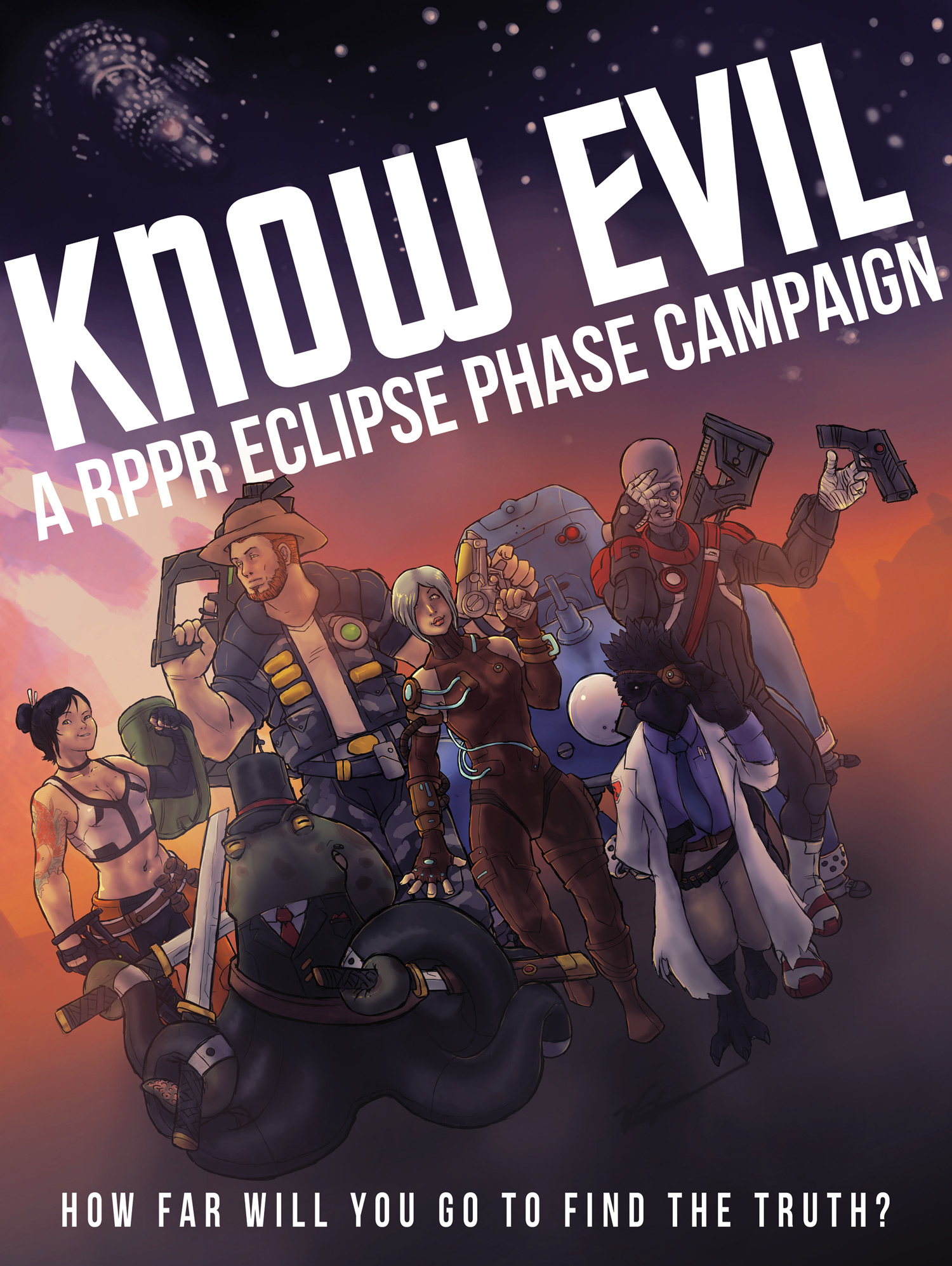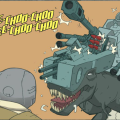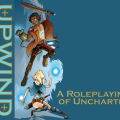 A heinous crime has been committed on 28th century, corporate controlled Mars. A powerful corporate executive has been brutally assassinated, apparently while committing corporate espionage with underworld elements. Instead of a standard investigative team, three different agents from three different corporations have been called in to investigate the crime. Is there something that ties these three different agents together? And what kind of nightclub caters exclusively to AI robots? Find out!
A heinous crime has been committed on 28th century, corporate controlled Mars. A powerful corporate executive has been brutally assassinated, apparently while committing corporate espionage with underworld elements. Instead of a standard investigative team, three different agents from three different corporations have been called in to investigate the crime. Is there something that ties these three different agents together? And what kind of nightclub caters exclusively to AI robots? Find out!
Podcast: Play in new window | Download (Duration: 3:21:34 — 69.4MB)
Subscribe: RSS






Hey, I was waiting for this. I happened by a post that you guys had done a playthrough.
Wow, that was pretty great!
I have to look into this system more, I’ve never heard of it before!
The grid of stats approach sounds really interesting. Surprisingly functional with a large number of stats.
Oh neat! Looking forward to playing this one. HSD’s got some good ideas, and y’all are always a lot of fun to listen to. Very cool!
I played this a few times at a local meetup group. For the most part I enjoy it, but I will definitely acknowledge that there are some blurred lines when it comes to stats. There are cases in which an Attribute: Strength makes as much sense as an Attribute: Acuity. For example, in the part where one of the characters was trying to “think like a criminal”, you could easily justify more than one stat (mental: strength because you’re using raw brainpower, mental: dexterity because you’re trying to think of cunning plans or thinking outside of the box, mental: acuity because you’ve studied criminology and understand typical underworld thinking patterns). Some may see that as a plus (flexibility), some as a drawback (lack of consensus). I will say that I only find it odd in a game with so many specific “bits” to it. 20 attributes sounds crunchy to me so I’d expect it to be more rules-heavy and exacting, yet it’s surprisingly flexible in spite of that.
It’s strange that shooting a gun is based on Mental Acuity, the same attribute that governs one’s ability to discern patterns after continued observation. For balance reasons I can understand why the creator might’ve done it – dexterity is often the god tier stat in combat-heavy games.
Either way, Tom did a great job with this one. Looking forward to the next episode!
The stat grid is a little overwhelming at first, and there’s some ambiguity in the way the stats play out. It’s one of the ways in which HSD is a more modern indie game–many roads to Jerusalem, different ways to reach the same results.
As I understand it, the next version of the rules will have some of this streamlined a bit, with 12 stats instead of 20. They’re kind of shades of each other in many ways–it’s a lot more gray, less like traditional D&D. The substats are more like flavors of a master stat – “mind/resist,” “physical/do a thing,” “Community/wits…”
It’s kind of interesting how this and Eclipse Phase are kind of going in different directions within a vaguely similar (and mostly unexplored within RPGs?) niche. (Dramatic questions of identity and its modification in a futuristic setting) Eclipse Phase wants to err on the side of complication and simulationism rather than simplification, being more about strategy and tactics than (for lack of a better word) ‘human’ stories, unlike HSD; but from what I’ve heard HSD started trying to find a balance between narrative and simulationism and is now set to go straight into highly-narratively-biased mechanical simplicity in later editions, relying on the quality of the writing/roleplaying going on rather than unexpected situations emerging from the simulation to create drama.
As far as I know, there have been plenty of simple, rules-light games in comical (Paranoia) or non-tech-focused settings, but dark cyberpunky settings have almost always accompanied very simulationist, imposing systems.
I’ll be interested to see how this goes. It’s always nice to see variety and branching out within genres I like.
One more thing is that, from what I can tell, HSD doesn’t have a… viewer sympathy culture? A designated good guy, or romanticized stand-in for the readers or writers? I mean like EP’s anarchists or the viewpoint characters of most criminality-focused cyberpunk, the embodiment of a modern person’s horror at the impersonal brutality of the cyberpunk dystopia and a rebellion against it, even if misguided or self-serving.
The structure of HSD posits a whole multi-planet, multi-species civilization that conveniently has never experienced a non-cyberpunk phase. Corporatism and plutocracy are to them what tribalism is to us, the underlying foundation from which other forms of civilization need to spring and the default to which they will always teeter towards when unstable, which is both unique as a setting feature and absolutely terrifying from a philosophical standpoint.
Most cyberpunk has within it heroes with a longing for the past, or at least a recognition of certain grand ideals (most often, personal freedom or equality, the downfall of those who gained wealth and power at the expense of the weak, the existence of inalienable rights, etc.) too deep and ancient for the current social order to fully snuff out, and thus follows underdogs and outcasts who try to impose something more appealing to a modern person’s sense of justice (and insecurities about present trends) upon the uncaring world, or at least bring emotive, if just as brutal, chaos to the unfeeling, oppressive order characterizing the setting.
It’s only recently that I’ve started to see more media surrounding… I guess I’d call it ‘normality’ or ‘coping’ in a stereotypically ‘cyberpunk’ setting, rather than romanticized rebellion. Not the outsider heroes throwing a middle finger to the system, but people doing the best they can to keep themselves alive and comfortable within the fast-moving, pervasively connected, violently uncaring world. I wonder what that says about us…
Perhaps a more fatalistic outlook towards surveillance, oppression and inequality than the writers of the 80s and 90s, when Carnivore was a spooky conspiracy theory instead of a quaint, harmless, infantile historical precursor to modern threats, and the resurgence of fascism as a legitimate political philosophy had not yet occurred?
It seems to me that our escapist future narrative has changed from “No matter how dark things get, some people will still fight for what the world owes them!” to “No matter how dark things get, life will go on. With some sacrifices maybe, but with determination, cleverness, and a good dose of paranoia, people will be able to adapt, and occasionally, justice will get done anyway.”. This isn’t to say that one is better than the other, of course. It’s just interesting. The whole point of science fiction is to comment on the present, and the shift in popularity within darker sci-fi would seem to represent a shift in our fears and the way we commonly deal with them.
Deimos: I’d be curious to see how the 12 stat thing would work. Has Pierce mentioned how he’s splitting it up? I was thinking about this the other day; HSD seems to borrow from White Wolf a bit. In WW games you have mental, physical and social, and then a “strength”, “dexterity” and “resilience” attribute for each of those categories. That seems to cover all the bases pretty well. So I wonder if his plan is to have the four categories (body, mind, community, economy) and just have the strength/dexterity/resilience versions of each of those, making 12 total.
Having five of each seems unnecessary because it’s either too specific and requires a lot of overhead to understand how each one applies to every different situation, OR it’s flexible enough to where the five stats are less meaningful.
With Dexterity being part of hacking, I am guessing they are doing the CSI type faster method
AmishNinja – AFAIK the two biggest influences on the mechanics of HSD were Shadowrun and White Wolf (historically, two products that also share a common ancestry, the “pool+difficulty” system was brought in with one of White Wolf’s early game devs who worked on Shadowrun back in the day.
Basically, the revisions to the stat system are that “Economy” is going away, it was always a bit of an oddball and the least game-by-game relevant stat — and one that it’s virtually required to dump “character points” on.
I think Dexterity and Strength are being combined into a general “do stuff” stat.
Here’s the video where the author unpacks his alpha of the new material, I’m going to be opening the video up and discussing the changes on my HSD-focused podcast soonish. If I survive Christmas.
Matz05 – thank you for that rich comment!!! I’m going to absolutely borrow from that 🙂 As a niche product that was largely marketed to the furry fandom (it has strength outside that group, but that’s definitely where its funding base was on Kickstarter…) I think the powerful level of wish fulfillment in the Vector race may fill some of the void for a reader-sympathy character. In my interactions with the product and the author, I’m seeing more of the edges of his world being a humanist fantasy at heart, where culture is much cleaner without the muddy lens of magical thinking or inherited tribes and identities.
The corporate culture model came from a world-wide-village utopian view, where the net.community evolved into a global worldview that directly opposed terran government (which itself evolved into a One World Government.) The “Us” is the group that fled earth – a mindset that evolved from the freely shared information and society of the internets. The “them” got, well, nuked.
Interesting. So, one of the sort of… theme questions that is explored, in your opinion, is the relationship of, for want of more neutral words, ‘business’ (association by choice and mutual advantage) and ‘family’ (association by arbitrary, historical divisions) as competing models of social interaction, and the question of what would happen if everyone abandoned the latter for the former, being who they were and interacting socially how they do for well-explained and rational reasons? (‘I like him’ or ‘It pays well’ is a good reason for something, whereas a reason that starts with ‘Well, you see, hundreds of years ago some people in powdered wigs decided there was an imaginary line about 50 km to the south of here…’ is clearly not.)
It’s the replacement of “I’m beholden to this individual because of historical accident” with “I’m beholden to this individual because I benefit from having them around”.
Basically the utopia of Extropians and whatnot. A radical equality of opportunity sort of scenario. A world with no prejudice but utility. Where “who are you” is answered by a list of your attractive features (skills, connections, hobbies, etc.) and not by accidents of place, time, and ancestry.
Interesting. I can see how that can be a positive. The global citizen, ‘Internet people’ types have enough with the BS of legacy hierarchies and power structures and storm off the planet with the Alphabets and Amazons and Apples of their world to build their own civilization, where people do things because they’re beneficial and rationally agreed upon and nobody freaks out when you go around installing super-powered robot hands or creating novel forms of intelligent life or turning yourself into whatever. Predictably, Old Power freaks out anyway. A little genocidal interplanetary warfare later and the new social structures are suddenly the only game in town (and while there are plenty of Mad Science People of various types around, their ‘parents’, the original, bland vanilla defectors from history and circumstance, are simply not present in demographically viable numbers in recognizable forms.). Drop curtain, time passes, raise curtain, roll theme music, enter our heroes…
This type of family-less society-of-convenience has big, scary problems when you run into reasons why not all association is completely voluntary, when limits of livable space or resources or other practical concerns manifest themselves as power imbalances and their inevitable exploitation, but all societies’ main problems stem from inequality and coercion anyway. It’s not like ours are an exception. The problems of such a hypothetical society are just simpler, more obvious, and more explainable without relying on a ‘because history’ explanation than ours are. As you put it, it’s a very ‘clean’ society, fresh out of a cataclysm that broke it cleanly off of any sort of context or legacy, which makes the sharp edges much more easily visible than those of our own, caked in our many thousands of years of history obscuring the original hazards.
Fresh perspective is always nice, I guess!
I think it’s not so much a “family-less” society as a society of acceptance, normalisation, and innovation. You don’t give up on your family, that hasn’t been mentioned one way or another in the core rulebook at least, and familial ties I imagine are still strong. There are hints also that species wise there’s more camaraderie internally (dogs trust dogs) than externally, but generally they still appreciate each other (no specist bigots). Normalisation comes in at the ground floor. Literally all of Vector kind started at the same place and roughly within a generation of each other. They’re made from the same template, given the same abilities (more or less, genetic engineering flubs aside), and so on. Society wise they’re normalised as well. You’re all employees, more or less, and there’s no real reason not to be one. It isn’t an oppressive environment where you must obey. Your companies genuinely appear to care about their workers (at least in a general sense).
I see the world portrayed more as one where big brother was embraced, and he does what he can to make your life better, as long as you’re productive in society. “Government subsidised” focused education to ensure viability in the current marketplace, universal effective healthcare via Progenitus, social insurance/minimum living expenses that more or less balances out just for existing thanks to the ledger, it is an idyllic scenario.
You grow up in an ASR town, learn the ASR way of life, get taught useful ASR engineering skills, and when you graduate you’re fit and ready to pursue a job at ASR in one of their many subdivisions. Sometimes though when you’re growing up, the call of another corporation just speaks to you louder. You don’t want to grow up fiddling with robotics the rest of your life, you actually like organics, so you end up attending school with Pulse. Swapping Google for Facebook essentially, but big brother is still watching. You’ll be a productive member of society either way, working contract positions as they come up, but even so you’re virtually guaranteed a decent life due to the ledger system. You aren’t giving up on your family that raised you, but you are moving out and pursuing your life without them. That isn’t so different from contemporary roles. And you get the same parallels too. Mom and dad may have wanted you to grow up to be a doctor or a lawyer, but instead you went and became an engineer. Here, instead, your mom and dad were hoping you’d grow up to be a cog mechanic, and here you are becoming a geneticist working on pro sport players doing reclamation surgeries and macro enhancements.
There are elements of the HSD world that are sanitized. Holding onto the idea that the game is about society and culture–marketing copy says, it’s a game about being human, but without quite as much baggage–there’s not a lot of society. Religion is downplayed (there’s a few small cults mentioned in the color text section of the Extended rulebook.) I’ve been specifically focusing on holidays in the HSD world this week, and the author suggested that there were a few secular observances, and the rest of the year is primarily eggnog-style holidays of artificially limited goods and services.
Further, the family IS weaker in HSD. Kids are “neuroplexed” (“…I know kung fu!”) and age-accellerated to get through those awkward diaper-changing years. It’s the world’s alternative to maternity leave – your corp gives you “time” in the form of scifi child rearing to keep you at work. That, and the general lack of religious norms, I haven’t really been able to learn whether Vectors, say, get married, have polycules, or how the family unit really works.
I’d also love to find more evidence of a counterculture presence in the books. Where’s my sci-fi rave scene?
That’s not entirely on the author, but since the game values society and community over combat (in a meaningful way. “where your rules are, there’s your heart.” The combat section is reasonably brief and balanced, and there are rules for social conflict) I could have used more “a day in the life of” materials. However, the first rulebook was a pretty big monster and print costs are a thing.
Which may be coming! The next big release for HSD is a “lorebook” that goes into greater detail on–well, we have a pretty intimate tour of a Spyglass city and mad ravings from the bible of Trancendent Technology released as sneak previews. I think there’ll be a lot more color in the lorebook.
You could make an argument that vectors are as much a product as a people. They generate money for the corporations, simply by living and breathing and letting their ledger programs tick quietly in the background. In American society, a human who’s permanently out of work is a negative. In Vectorland, they’re still productive, if not hugely so. I feel like the corporate masters tend to view them as such.
So far as society goes, it’s not universal that there are/aren’t species purists, strong negative stereotyping, etc. I think Bears tend to pick up hatreds of species as the dark flipside of one of their optional abilities, and bears are weirdly outside society in general. On the “vectors are a product” angle, bears were part of the first vat of vectors, but for some reason their species documentation got erased or something, an anthro bear looks quite a bit like an anthro canid, and overall they’ve got a sort of “why are YOU here…” attitude thrown at them, and a self-fulfilling prophecy of bears as a drifting, rootless people.
And birds are crazy. First the horror of the owl accident (birds have fewer identified subspecies than other vectors because the owl batch was horribly corrupt and dangerous). And their racial abilities make them twitchy and hair-trigger. Popular conception of them is “kind of dangerous, be wary.”
Deep in the back-history, there are a few race wars–cats vs. cats, cats vs. rats, and cats vs. rabbits. These were mostly conducted at a corporate level.
But since all races (including Cogs…think on that…) can interbreed (and occasionally, foxes lay eggs, true story), it does seem like lines are softened and race isn’t the dominant bigotry. Primarily, conflict seems to be between corps–there’s a concept of “hot zones” where borders between corptowns can become armed and dangerous urban danger zones.
On the surface Vector life is pretty utopian, but like all good utopias there’s some awful stuff under the gold-paved bricks. Pirates, massive corporate dishonesty in the medical field, experimenting on the population of a corptown for medical research without their consent…fundamentally, vector society is enlightened anarchy moderated by corporate interest. It DOES work well for them generally, and I think the main rulebook’s color text emphasizes this. The Extended rulebook is a little darker.
My cohost Ashtaar and I disagree on this a lot – I’m prone to taking the books at their word on the utopian angles, but he points out that the writing is “too good to be true” in a possibly intentional manner. There’s evidence to support that.
Yeah, reading more about this system, it looks more and more… optimistic.
Sure, there’s plenty of things out there that could very easily be played for horror, or go south quickly, but it seems to be designed in a much lighter tone than, for example (as it’s the closest setting I could think of) Eclipse Phase. (which might be a bad example, as it’s supposed to be a less grimdark, higher power-level version of a cosmic horror story, which is still darker than pretty much any other kind of story except maybe war stories) Everything in HSD seems to pretty much work as well as it could for the largest possible majority in the greatest number of cases. To continue using Eclipse Phase references, it’s more like a mature, stabilized version of the good parts of Extropia on a wider scale than the generic ‘cyberpunky’ oppression and carefully cultivated scarcity of the inner system, or a system narratively balanced for a dramatic and preordained fall like the few pre-apocalypse glimpses at Rapture in the Bioshock video games. Typically, these experimental societies are written as lectures (some less subtle than others) of their threats, to the point where it’s almost become difficult to recognize real optimism (or even fair treatment) as opposed to trickery designed to drive the same point in later in the work.
HSD is kind of a similar optimistic take on an alarm-bell-ringing concept as Star Trek gives to their surprisingly expansionist, vaguely communist/fascist utopia. (Have you ever heard of non-state run travel services or news broadcasts in the Federation? Frontline exploration and diplomacy (usually offers to join the empire) from the bridge of a gunboat (or in this case a starship bearing a nuclear-equivalent arsenal comparable to Cold War America, plus the huge beam guns) is also traditionally frowned upon!)
Outsiders look and say “I’ve seen this trope before!” and wait for the other shoe to drop, for all the vaguely unsettling fridge-logic questions to suddenly resolve in the revelation of horrific conspiracies and atrocities without historical equal, but the expected ‘twist’ never comes. Eventually, the fandom of the media stops noticing the ‘foreshadowing’ that outsiders see, because that’s just how the setting works, and the ‘good guys’ more or less consistently act like it, so what people ‘could’ do with their power stops being scary.
So what if all the other ‘enlightened’ space empires in every other series who just want to share their knowledge and culture with you, no strings attached, for real this time (see the people who hand out free life-extension treatments that secretly sterilize people and then invade near-empty planets 200 or so years later in Stargate, for an example) are secretly evil?
In Star Trek it can be taken for granted that they’re the good guys, now and for the foreseeable future.
For someone used to any other space opera, the setting of Star Trek seems to be setting up a ‘surprise’ twist you can call a mile away. (The friendly, attractive people in the beautiful starships who claim to have solved all their societal problems and are eager to share their solutions with you are actually evil! SURPRISE! [resounding sound of people not being surprised])
I guess… ‘post-cyberpunk’ stuff like HSD suffers from a similar thing, magnified by the fact that unlike Star Trek, it’s not considered the ‘default’ flavour of sci-fi, and is in fact less widely recognized than its played-for-dark ‘twin’.
Anyway, I’m excited to hear more, this seems to be the only actual play I could find of this fairly obscure but very interesting game.
Just to point out, there are non-state run travelers who are federation citizens. They’re almost never shown, but they do show up here and there. Anya/Seven of Nine’s parents were researchers for the federation, but headed off on their own as federation citizens with their own private craft to search for borg (as an example).
The lens of our view of their universe is that of a military ship on a supposed intergalactic diplomatic mission of peaceful exploration. But again, just as we almost never see the civilian ships, we never see the peaceful times either. Where are the episodes where we see the Enterprise successfully open peaceful negotiations for a trade agreement with absolutely no surprise alien invasions or horrible secret side of the populous that is actually technophages who try to consume the ship? Where are the episodes where the crew goes to Risa, and they have a swimsuit episode a la anime tropes with the only drama being who the plucky ensign of the episode goes to the night time bonfire with?
Those are boring times, just like the civilian ships are boring and unrelated vessels who wouldn’t be out on the frontier doing trade with unknown worlds. They’d be coreward, where none of the exciting stuff happens.
In more recent years there have been a number of very narrativist cyberpunk games. The ones I’m most familiar with (things like The Sprawl and Headspace) use variants of the Apocalypse World ruleset (which also powers things like Dungeon World), but there’s also an official Fate conversion of Eclipse Phase, as well as more esoteric stuff like Always/Never/Now (a cyberpunk adventure and system in one), Ghost/echo (a single sheet cyberpunk/ghost hunting RPG), etc.